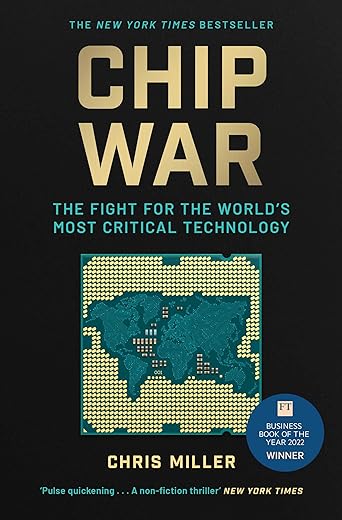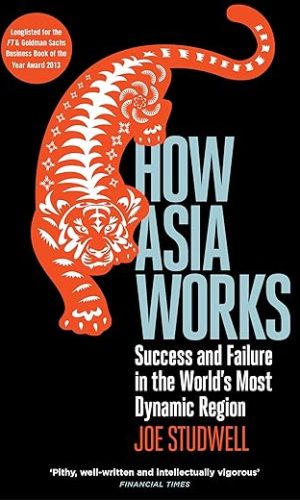Chip War: The Fight for the World’s Most Critical Technology
£9.49£10.99 (-14%)
‘Pulse quickening. A nonfiction thriller – equal parts The China Syndrome and Mission Impossible’ New York Times
An epic account of the decades-long battle to control the world’s most critical resource—microchip technology
Power in the modern world – military, economic, geopolitical – is built on a foundation of computer chips. America has maintained its lead as a superpower because it has dominated advances in computer chips and all the technology that chips have enabled. (Virtually everything runs on chips: cars, phones, the stock market, even the electric grid.) Now that edge is in danger of slipping, undermined by the naïve assumption that globalising the chip industry and letting players in Taiwan, Korea and Europe take over manufacturing serves America’s interests. Currently, as Chip War reveals, China, which spends more on chips than any other product, is pouring billions into a chip-building Manhattan Project to catch up to the US.
In Chip War economic historian Chris Miller recounts the fascinating sequence of events that led to the United States perfecting chip design, and how faster chips helped defeat the Soviet Union (by rendering the Russians’ arsenal of precision-guided weapons obsolete). The battle to control this industry will shape our future. China spends more money importing chips than buying oil, and they are China’s greatest external vulnerability as they are fundamentally reliant on foreign chips. But with 37 per cent of the global supply of chips being made in Taiwan, within easy range of Chinese missiles, the West’s fear is that a solution may be close at hand.
‘A riveting history. Features vivid accounts and colourful characters’ Financial Times
‘Fascinating…A historian by training, Miller walks the reader through decades of semiconductor history – a subject that comes to life thanks to [his] use of colorful anecdotes’ Forbes
‘Indispensable’ Niall Ferguson
Read more










by S. Liiceanu
Maybe it’s because I read Chip Wars straight after reading the excelling The Idea Factory (which covers the history of Bell Labs), or maybe it’s because I’d head most of the stories and tech information in this book told better on the Asianometry youtube channel… but this book didn’t do it for me. What I expected was a broad chronological story of the semiconductor industry, and/or indept biographies of key people involved in its history. What you actually find in this book is a lot of short chapters that fragment the story in a short magazine-like articles or blog posts. It feels like there’s a much better book to be written on this subject and Chip Wars has only achieved its level of success because it was one of the first.
by G.C.
An excellent history of modern tech. We take all these chips for granted, but how secure are we on maintaining supply and how did we get here. Covid exposed many problems of supply as people now spend time waiting for a new car because of chip supply. Supply is on a wing and a prayer. Moves are being made to correct this but it will take many years and many billions. A real eye opener.
by G.C.
t has taken me far too long to finish Chip War and write this review. Chip War was one of the FT’s best business books of 2022. In reality it’s a book about history, that happens to feature businesses.
Chip War
The lens shaping everything else that I have written here
I am a sucker for books on the history of technology and Chip War was right in my wheelhouse. It complemented, rather than overlapped some of my existing favourite technology history books like Bob Cringely’s Accidental Empires, John Markoff’s What The Dormouse Said or most of Michael Malone and Steven Levy’s output to date.
The author
The author Chris Miller wasn’t a familiar name to me. Unlike Cringely, Markoff, Malone or Levy; Miller is an academic rather than a former journalist. Miller currently teaches international history at Tufts University. Chip War wasn’t his first book, his previous ones have focused on Soviet and Russian history. As a technology sector outsider, Miller’s Chip War has a very different tone my other favourite books from the genre.
It also allowed Miller to view the history of semiconductors in terms of a global perspective, that I hadn’t previously seen done.
On to Chip War itself
Other reviewers have used words like ‘outstanding’ and ‘epic’ to describe the book – which while being a reasonable guide to overall quality and length of read aren’t really all that helpful. It took me six months to read as a casual book. This is partly down to a hectic work schedule and that its a long book. I suspect that some readers when they reviewed the book seem to have thought ‘long’ as difficult to read. It’s actually 351 pages ignoring acknowledgements and the footnotes at the back of the book. Being an academic Miller worked hard to source everything in Chip War.
The book starts in the post-war period as the defence industry moves from being focused on hammering steel to developing smarter systems using semiconductors. That road takes the book past Texas Instruments and the early Silicon Valley of Bob Noyce and other members of the treacherous eight.
The book also zooms out to cover the Soviet Union’s failed efforts to replicate Silicon Valley as well as domestic industrial espionage and the start of globalisation which begat the current industry.
The Japanese challenge is covered in depth as is the rise of Korea including challenges that the industry faced in the early 2000s. The rise of Taiwan and its use of semiconductors as a hedge against invasion from the mainland. European tool maker ASML gets its own section, which is a case study in how to make a virtue of necessity. Finally it covers the technology conflict with China. Bring this up to date circa 2022.
If you are student of Silicon Valley history, then Chip War is unique in the way it puts everything in context. There were some completely new parts to me such as the political role that Sony founder Akio Morita played in advocating for a robust Japanese semiconductor industry as part of reasserting Japanese importance internationally.
by N.C.Harrison
The book is the product of brilliance, meticulous research comprising both original sources and an extensive net of roughly one hundred interviews and a nearly phenomenal ability of the author to present complex issues with crystalline clarity.
To appreciate the significance of the conflict, one has to realize that the future of war will be defined by computer power.
And to appreciate the enormous evolution of chips suffice it to say that an Apple iPhone 12 is powered by an A14 processor chip with 11.8 billion transistors carved into its silicon while only sixty years ago the number of transistors on a cutting-edge chip was just four.
It was Gordon Moore that noticed in 1965 that the number of components that could fit on a chip and consequently computing power was doubling every two years; the prediction that the computer power would grow exponentially was called ‘Moore’s Law’.
At the core of computing is the need for many millions of 1s and 0s. The entire digital universe consists of these two numbers. Every button on an iPhone, every email, photograph, and YouTube Video – all of these are coded, ultimately, in vast strings of 1s and 0s. But these numbers do not actually exist. They are expressions of electrical currents, which are either on (1) or off (0). A chip is a grid of millions or billions of transistors, tiny electrical switches that flip on and off to process these digits, to remember them, and to convert real world sensations like images, sound, and radio waves into millions and millions of 1s and 0s.
The cost of processing and remembering 1s and 0s has fallen by by a billionfold in the past half century.
The evolution of chips was shaped by economics, the military, space, politics, geopolitics, and globalization.
The term Silicon Valley was coined in the seventies to reflect the nearly absolute dominance of California in the sphere of chips.
America may have lost the war in Vietnam but won the subsequent peace by integrating South East Asia in chip production. To this day, however, while semiconductor supply chains requires components from many cities and countries, still almost every chip made has a Silicon Valley connection or is produced with tools designed and built in California.
It has, however, to be noted that Taiwan’s TSMC fabricates the chips that provide 37 percent of the world’s new computing power each year while it builds almost all the world’s most advanced processor chips; two South Korean companies produce 44 percent of the world’s memory chips; and the Dutch ASML builds one hundred percent of the world’s extreme ultraviolet lithography machines without which cutting edge chips are impossible to make.
The book was one of the more important books I have read in recent years in both content and delivery.
by Serghiou Const
What a ride! This book was an eye-opener. The writing style is very professional, the text packed with lots of useful information and the structure of the book itself helps the story unfold neatly. The author skillfully shows how the roots of the digital revolution began in the US and how the combination of valuable human capital and competition (again in the US) made possible all the subsequent advances. One of the key ideas here is that nowadays chips are more important than machine guns and the country who has the most advanced chips also has the best military technology. The US (and by extension the free world) still has the upper hand but competition from China is fierce.